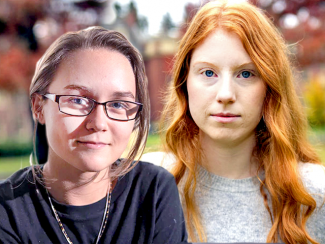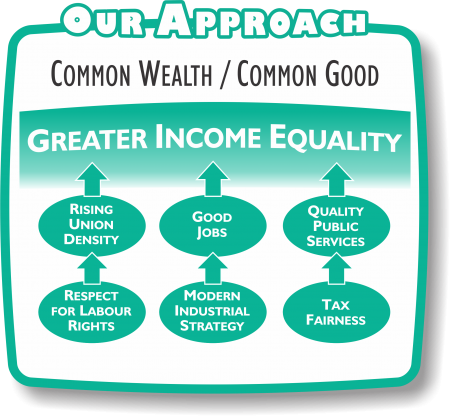LAWYERING UP
Canadian kids go to court to get climate change action

Sierra Robinson from Canada and Tia Holland from the USA: each are plaintiffs in lawsuits to force governments to do more to fight climate change
WE’LL SEE WHAT THE COURTS SAY! That’s the defiant message 15 young Canadian climate change activists sent to the federal government October 25. The 15 filed a lawsuit against the federal government for failing to protect them from the looming dangers of climate change.
This is “not a publicity stunt,” said Sierra Robinson, a 17-year-old farmer from the Cowichan Valley on Vancouver Island. “We’re serious and we’re suing the federal government.”
Sierra is one of 15 young people, aged 10 to 19, from eight provinces and one territory who filed the suit. They did it with the help of the David Suzuki Foundation and the US-based Our Children’s Trust, an organization that has helped many kids file similar lawsuits across the world.
A right to life, liberty and security of the person
The heart of the Canadian lawsuit is a claim by the 15 that the federal government has done too little to preserve and protect their right to life, liberty and security of the person, as guaranteed by the Canadian Charter of Rights and Freedoms.
The youth will also try to make the case that they’ve suffered “specific, individualized injuries” as a result of climate change, said Chris Tollefson, one of the lawyers representing the group.
The ultimate goal of the lawsuit is to force the government to implement a “science-based recovery plan,” Sierra said, based on advice from Canada’s top scientists.
Demanding their day in court
Juliana v. United States (aka Youth v. Gov) is one of the thousands of similar lawsuits young people are filing all around the world. The 21 kids in the Juliana actions filed their suit in 2015. Their lawyers are still working through the legal maze that might prevent them from ever having their day in court.
In a speech to a crowd of supporters after a June hearing in Portland, Oregon, 12-year old Levi Draheim, the youngest of the plaintiffs, made their argument as well as any grownup lawyer could.
“The constitution says that I have a right to life, liberty, and property,” Draheim said. “How am I supposed to enjoy life, liberty, and property, if one day, the island I live on in Florida will be underwater?”
For the 21 plaintiffs, the only adequate outcome is one that would return atmospheric carbon dioxide concentration to a cool 350 parts per million by the end of the century, limiting warming to 1 degree Celsius above pre-industrial levels. It’s a significantly more aggressive target than the 2-degree limit set by the Paris agreement.
Right now, the 21 are waiting for a court decision to effectively restore the case to where it was before the Trump administration’s latest appeal knocked it off course.
A rising tide of lawsuits
Joana Setzer says that asking the courts to hold “government and businesses to account for failing to combat climate change has become a global phenomenon.” Setzer is the co-author of a new report from the London School of Economics that focused on the 1,328 legal actions related to the climate crisis filed between 1990 and May 2019.
The suits have been brought by citizens, non-governmental organizations, businesses and local governments.
Key findings from the report include the facts that:
Climate change litigation continues to expand across jurisdictions as a tool to strengthen climate action
Climate change cases have been brought on every continent, in at least 28 countries around the world
Most defendants are governments, but lawsuits are increasingly targeting the highest greenhouse gas-emitting companies
Climate change-related claims are also being pursued by investors, activist shareholders, cities and states.
The report spotlights some high-profile lawsuits, such as Urgenda Foundation v. State of the Netherlands, “the first case to argue successfully for the adoption of stricter emissions reduction targets by a government.”
Outside the USA, 43 percent of the 305 cases were favourable to advancing climate change efforts.
Many of the lawsuits were brought by U.S. state governments and municipalities rather than citizens or NGOs. The plaintiffs allege that fossil fuel companies continued to produce fossil fuels while knowingly concealing the climate risks.
Any government or corporation that still thinks there is nothing to fear from a climate change lawsuit just isn’t paying attention.
- 30 -













Add new comment